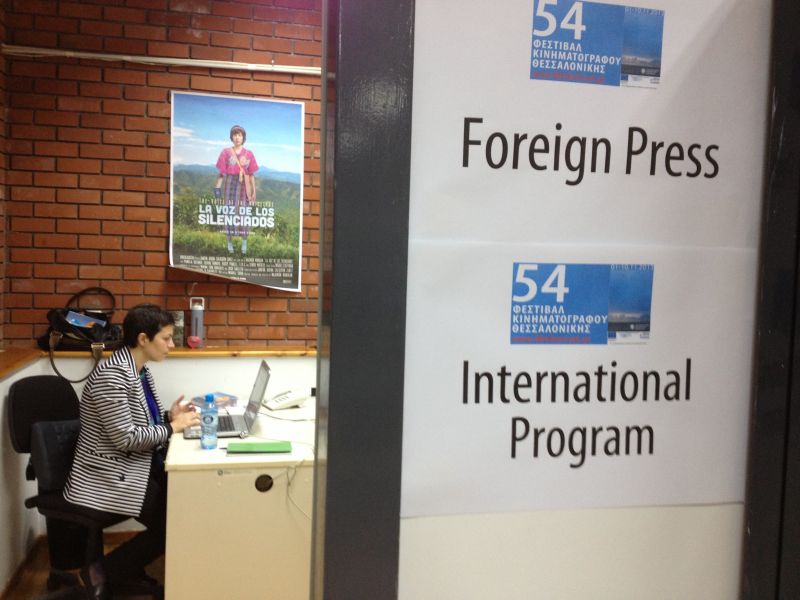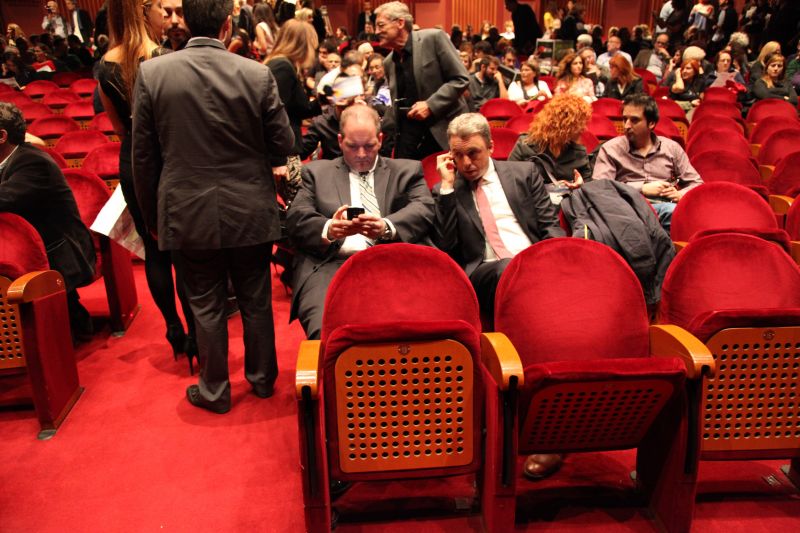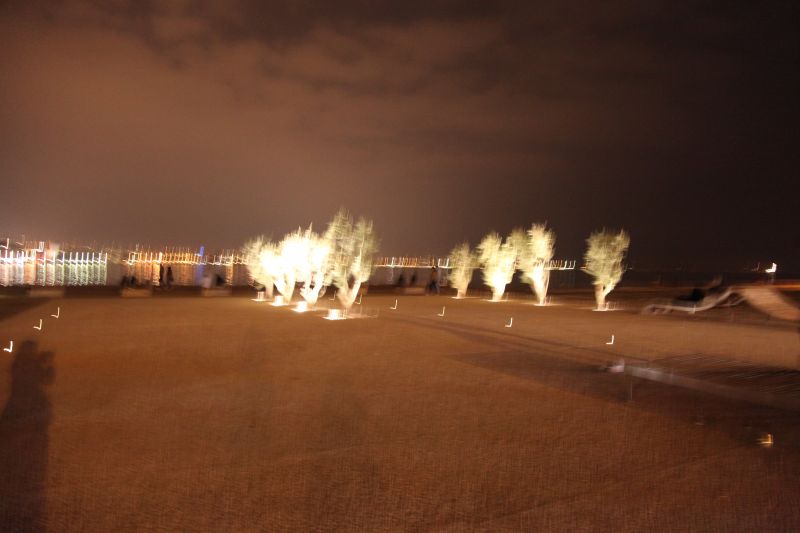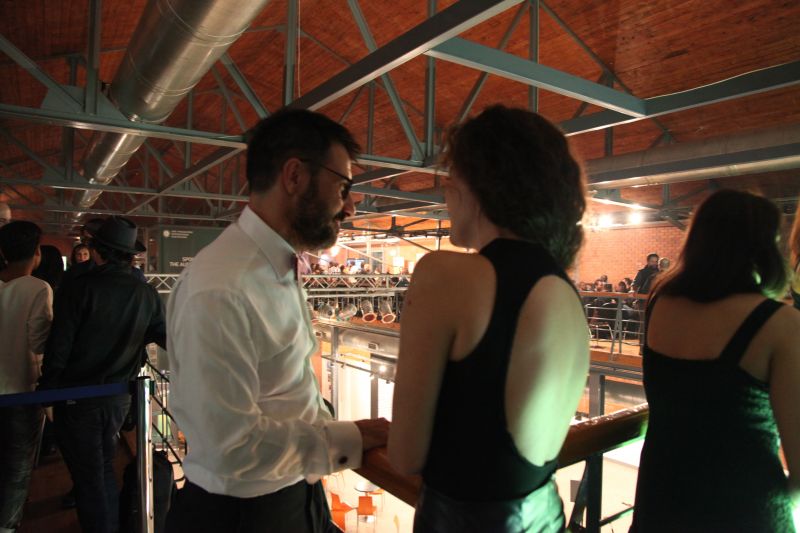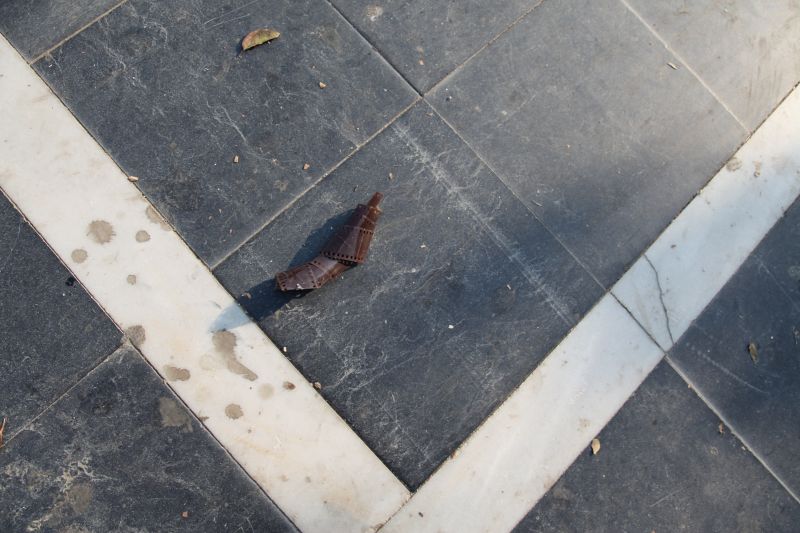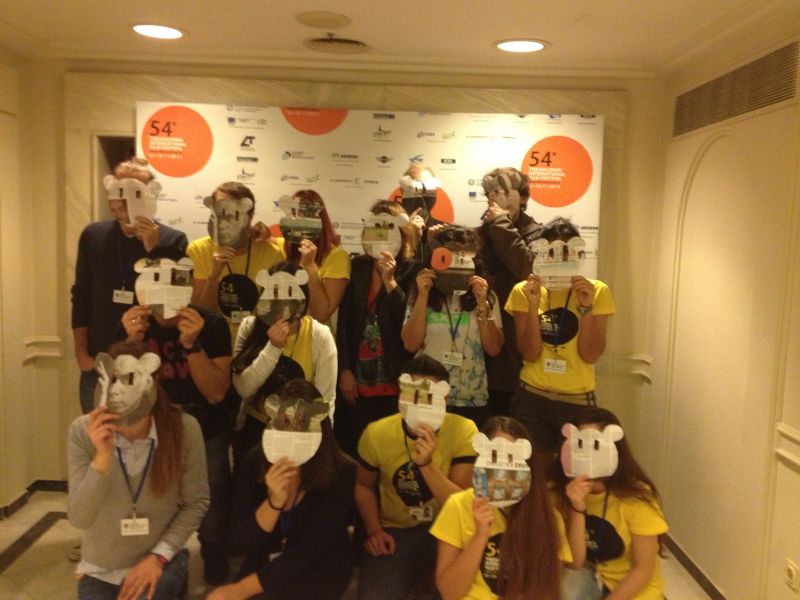|
|
||
|
Pro Tools
FILMFESTIVALS | 24/7 world wide coverageWelcome ! Enjoy the best of both worlds: Film & Festival News, exploring the best of the film festivals community. Launched in 1995, relentlessly connecting films to festivals, documenting and promoting festivals worldwide. Working on an upgrade soon. For collaboration, editorial contributions, or publicity, please send us an email here. User login |
ANDREAS DRESEN PRESS CONFERENCE 53rd TIFF
-OFFICIAL 53rd TIFF PRESS RELEASE- 53rd TIFF: Andreas Dresen Press Conference (11/9/2012) ANDREAS DRESEN PRESS CONFERENCE On Friday, November 9, 2012, German director Andreas Dresen gave a Press Conference as part of the tribute to his work organized by the 53rd Thessaloniki International Film Festival. Taking the floor, Andreas Dresen noted: “I am very happy to be here. I have heard a great deal about this festival from my friends in Germany and also international directors, and I have wanted to come for many years. Naturally, this tribute is a great honour for me and I hope to make more films, as I am only forty nine years old”. On how he chooses his subjects, he noted: “When I make a film I work on it for one or two years. It becomes a piece of my soul. The decision about the subject is difficult. Sometimes it happens by accident or coincidence. For example, the reason for my making Cloud 9, a film about the sexuality of old people, was that I had seen a very emotional film about the relationship between two elderly people. The film was sepia-toned with piano music, it was generally very beautiful, but it was saccharine and when I left the theatre I was outraged. I was thinking that cinema does not allow elderly people to have real passions and emotions. The next day I saw my friend and producer Christoph Muller and I told him about this film, still being angry. He said to me “let’s make something different on this subject, from another point of view”. From that point on the film was made quickly – production started in four months”. He added: “My films come out of my soul. This impulsiveness sometimes creates problems because difficulties arrise on the way and we have to stop or revise something”. Regarding his film Stopped on Track, which is about the last days of a family man with cancer, Mr. Dresen said: “This was a special production. For me it was more of a voyage than a film. For these kinds of subjects you must open little windows in the soul and the mind, which are usually locked. It was a painful process. Usually in our everyday life we refuse to think about some things”. He spoke about the background of the film’s production. “We had a very small crew, only seven people. Like a small Italian family, we would sit at the table and our producer cooked for us – he is a very good cook – and we discussed what we wanted to do, building up our story this way. The film is based on improvisation, it was low budget without a script, so the usual pressure of the film industry wasn’t there. It was a personal journey and we followed our hearts”. He confessed that there were times he wanted to stop making the film. “There was research done beforehand, conversations with doctors and families who had lost a loved one to cancer. These stories were compelling. Sometimes we would talk with them until two, three in the morning. After all that it was difficult for me to distance myself and return to my daily life. I was so moved I wanted to stop, but discussing it with my collaborators we decided to continue. Now I am very happy we did it. Sometimes you have to hit bottom in order to come up again. It is a moving film, I hope you go to see it and also experience these feelings. I believe there is light at the end, it is full of tenderness and gives one the opportunity to get out of the gloom”. Mr. Dresen discussed the improvisational element that he generally uses in his films: “That depends on whether or not there will be a script. In larger productions, such as Whiskey and Vodka and Night Shapes, there was a script whereas for Cloud 9, Grill Point and Stopped on Track we improvised. It is as if we all enter a dark room and search for the exit. As the director, I must lead. Sometimes we start without rehearsals and something simply happens. However, other scenes might need to be prepared more, step by step. Improvisation also gives me the opportunity to work with amateur actors. In the film Stopped on Track the doctors who appear are real doctors, they speak with their own words. It would be stupid for me to tell them what to say – they know best. This contributed to creating a more authentic atmosphere. Of course, to be honest, there is no authenticity in cinema. If you want to see reality you have to go out on the street. Perhaps in cinema there is some kind of truth”. Asked as to how he works with his actors, Andreas Dresen noted: “The key is human understanding. Usually, when I begin shooting I am full of fear because I am working with other people’s money. The more money I get through financing the more I am afraid to disappoint someone and I always want to make a good film. But this isn’t always possible. You want to do what is best, but it is important for the artist to take chances and forget the external factors. I have to make everyone forget them during production, to feel free and perform to the best of their ability. In Germany there is an outdated word for a director, which translates as ‘the leader of the game’. I like this idea very much, it is a game we play together. We can try things, sometimes we make mistakes, but in the end it is simply a film. During production I try to give everyone, particularly the actors, the feeling that we are playing, so they can forget their fears, and then something great can happen. As the director, I am responsible for them. I want to create a pleasant atmosphere, be creative, and involve them in a process where everyone can express what he believes. Then he explained what the most important thing he has learned from his experience is: “If you ask for a lot, you get nothing. The most important things on the set happen by accident. It is like a gift from God. If you create the right atmosphere, they offer themselves to you. It is important to be open, to allow things to happen”. Asked about the humour in the film Whiskey and Vodka, Andreas Dresen explained: “You know, we Germans are not known for our humour. Part of the script was written by a living legend, one of the best screenwriters in Germany, who is now 82 years old and is still working, who has a wonderful sense of humour. The actors also helped, they brought the humour to life”. But he noted: “To be honest, Whiskey and Vodka is not just a comedy for me. Behind the surface, there is darkness. It is a sad story of a man who has taken the wrong path in his life. It is a melancholy comedy, I would say”. About Cloud 9, which is about a romance between two elderly people, Mr. Dresen declared: “I am not afraid of old age, this is why I made this film. Production was in May 2009, and two months later we began production on the film Whiskey and Vodka. They are two films with similar subjects, but very different from each other. Cloud 9 is more optimistic, while Whiskey and Vodka is more troubled, because the characters are taking stock of their lives in order to see the mistakes they have made. On the contrary, in Cloud 9, you see that something can happen any time. We are only dead when we are in our casket. You can fall in love again even in your seventies and abandon your companion, like the heroine of the film. The reason is that love is a force of nature and we can’t protect ourselves from it, even if we are older”. Asked about what he expected to see in Thessaloniki, Mr. Dresen said: “I only arrived yesterday, I haven’t had a chance to see much yet. But from what I have heard from an Icelandic colleague who had come here a few years ago, I know how hospitable Greeks are. We hear a lot about the economic crisis, not only in Greece but also in all of Europe. I am not a politician, I don’t know how to solve these difficult problems. I know that many Greeks are going through a hard time. For me, solidarity among the people of Europe is always necessary. A wise man said: ‘Solidarity is the tendency between populations’”. He then added: “When I go back I will tell Angela Merkel to send Greece more money and I will support the Greek economy by drinking lots of retsina and ouzo –I hope that will be something”. Asked if it is difficult for his audience that there are no happy endings in his films, Mr. Dresen said: “I don’t think so. All my films are more or less optimistic. Even Stopped on Track is optimistic. There is no typical happy ending, but there is always hope. Just before I spoke of solidarity. It is not just a film about a death. We see it in the family that draws together to face a specific situation and everyone tries to find his way of dealing with the situation, to find a solution that will bring calmness. I don’t believe that the audience leaves the cinema feeling crushed”. Commenting on a line of dialogue said by the leading character of Whiskey and Vodka who says “making films is a waste of time”, Mr. Dresen explained: “Making films means devoting time out of your life. This is why it is important to me to have a good time with other people. When you begin, you don’t know in advance what the result will be, failure is always lurking. Sometimes it is more important to have a very nice journey and not just struggle for the perfect result, which of course we do. You must make sure you spend your time well, with people you like, to be creative and to try new things. If you are too afraid, you have already lost”. Andreas Dresen finished the press conference by quoting a line by Samuel Beckett on failure and risk: “Always an effort. Always failure. It doesn’t matter. Try again. Fail again. Fail better”. -OFFICIAL 53rd TIFF PRESS RELEASE-
Press conference photos by Martin Petrov 12.11.2012 | Thessaloniki International Film Festival's blog Cat. : Andreas Dresen Press ANDREAS DRESEN PRESS CONFERENCE Angela Merkel Christoph Müller Dresen Entertainment Entertainment Europe Germany Greece Martin Petrov Punctuation Samuel Beckett Social Issues Social Issues The 53rd Thessaloniki International Film Festival
|
LinksThe Bulletin Board > The Bulletin Board Blog Following News Interview with IFTA Chairman (AFM)
Interview with Cannes Marche du Film Director
Filmfestivals.com dailies live coverage from > Live from India
Useful links for the indies: > Big files transfer
+ SUBSCRIBE to the weekly Newsletter Deals+ Special offers and discounts from filmfestivals.com Selected fun offers
> Bonus Casino
User imagesAbout Thessaloniki International Film Festival Industry: CROSSROADS Co-Production Forum,AGORA, script-development BALKAN FUND. Competition for directors with 1st or 2nd films. Golden Alexander Prize 37.000 € Coverage by Vanessa McMahon, Laurie Gordon View my profile Send me a message The EditorUser contributions |






















